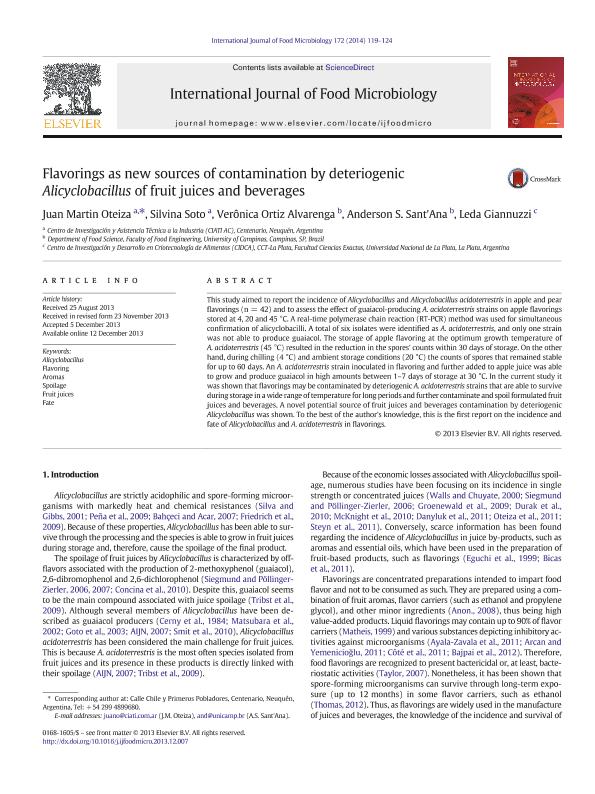Mostrar el registro sencillo del ítem
dc.contributor.author
Oteiza, Juan Martín

dc.contributor.author
Soto, Silvina
dc.contributor.author
Ortiz Alvarenga, Verónica
dc.contributor.author
Sant Ana, Anderson S.
dc.contributor.author
Giannuzzi, Leda

dc.date.available
2017-12-01T18:25:54Z
dc.date.issued
2014-02-17
dc.identifier.citation
Oteiza, Juan Martín; Soto, Silvina; Ortiz Alvarenga, Verónica; Sant Ana, Anderson S.; Giannuzzi, Leda; Flavorings as new sources of contamination by deteriogenic Alicyclobacillus of fruit juices and beverages; Elsevier Science; International Journal of Food Microbiology; 172; 2014; 17-2-2014; 119-124
dc.identifier.issn
0168-1605
dc.identifier.uri
http://hdl.handle.net/11336/29476
dc.description.abstract
This study aimed to report the incidence of Alicyclobacillus and Alicyclobacillus acidoterrestris in apple and pear flavorings (n = 42) and to assess the effect of guaiacol-producing A. acidoterrestris strains on apple flavorings stored at 4, 20 and 45 °C. <br />A real-time polymerase chain reaction (RT-PCR) method was used for simultaneous confirmation of alicyclobacilli. A total of six isolates were identified as A. acidoterrestris, and only one strain was not able to produce guaiacol. The storage of apple flavoring at the optimum growth temperature of A. acidoterrestris (45 °C) resulted in the reduction in the spores´ counts within 30 days of storage. On the other hand, during chilling (4 °C) and ambient storage conditions (20 °C) the counts of spores that remained stable for up to 60 days. An A. acidoterrestris strain inoculated in flavoring and further added to apple juice was able to grow and produce guaiacol in high amounts between 1?7 days of storage at 30 °C. In the current study it was shown that flavorings may be contaminated by deteriogenic A. acidoterrestris strains that are able to survive during storage in awide range of temperature for long periods and further contaminate and spoil formulated fruit<br />juices and beverages. A novel potential source of fruit juices and beverages contamination by deteriogenic Alicyclobacillus was shown. To the best of the author´s knowledge, this is the first report on the incidence and fate of Alicyclobacillus and A. acidoterrestris in flavorings.
dc.format
application/pdf
dc.language.iso
eng
dc.publisher
Elsevier Science

dc.rights
info:eu-repo/semantics/openAccess
dc.rights.uri
https://creativecommons.org/licenses/by-nc-sa/2.5/ar/
dc.subject
Alicyclobacillus
dc.subject
Flavoring
dc.subject
Aromas
dc.subject
Spoilage
dc.title
Flavorings as new sources of contamination by deteriogenic Alicyclobacillus of fruit juices and beverages
dc.type
info:eu-repo/semantics/article
dc.type
info:ar-repo/semantics/artículo
dc.type
info:eu-repo/semantics/publishedVersion
dc.date.updated
2017-09-29T16:35:32Z
dc.journal.volume
172
dc.journal.number
2014
dc.journal.pagination
119-124
dc.journal.pais
Países Bajos

dc.journal.ciudad
Amsterdam
dc.description.fil
Fil: Oteiza, Juan Martín. Centro de Invest. y Asistencia Tec. A la Industria; Argentina
dc.description.fil
Fil: Soto, Silvina. Centro de Invest. y Asistencia Tec. A la Industria; Argentina
dc.description.fil
Fil: Ortiz Alvarenga, Verónica. Universidade Estadual de Campinas; Brasil
dc.description.fil
Fil: Sant Ana, Anderson S.. Universidade Estadual de Campinas; Brasil
dc.description.fil
Fil: Giannuzzi, Leda. Provincia de Buenos Aires. Gobernación. Comisión de Investigaciones Científicas. Centro de Investigación y Desarrollo en Criotecnología de Alimentos. Consejo Nacional de Investigaciones Científicas y Técnicas. Centro Científico Tecnológico Conicet - La Plata. Centro de Investigación y Desarrollo en Criotecnología de Alimentos. Universidad Nacional de La Plata. Facultad de Ciencias Exactas. Centro de Investigación y Desarrollo en Criotecnología de Alimentos; Argentina
dc.journal.title
International Journal of Food Microbiology

dc.relation.alternativeid
info:eu-repo/semantics/altIdentifier/doi/http://dx.doi.org/10.1016/j.ijfoodmicro.2013.12.007
dc.relation.alternativeid
info:eu-repo/semantics/altIdentifier/url/http://www.sciencedirect.com/science/article/pii/S0168160513005746?via%3Dihub
Archivos asociados
